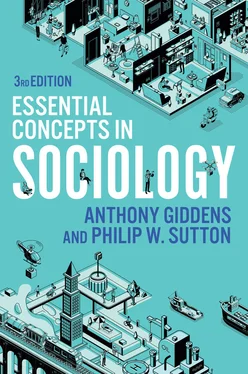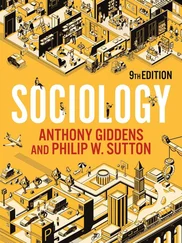1 ...8 9 10 12 13 14 ...20 A strong argument can be made that society has been the central concept in sociology, which Émile Durkheim used to establish the new discipline dealing with the collective reality of human life as opposed to studying individuals. Durkheim ([1893] 1984) saw society as an independent reality that existed sui generis , or ‘in its own right’, and that had a profound influence on individuals within a bounded territory. Durkheim’s conception of society held its central place in sociology throughout much of the twentieth century and was seriously questioned only from the mid-1970s onwards. Theories of an emergent global level of social reality and theories of globalizationcalled Durkheim’s essentially nation-state-based concept of society into question. Studying social processes at the global level also drew attention to the movement of people, goods and cultureacross national boundaries, and in the 2000s there have been calls to move sociology beyond the concept of society altogether and into the potentially more productive analysis of ‘mobilities’.
Meaning and Interpretation
In sociology, the concept of society has been fundamental to its practitioners’ self- identity. Many dictionaries and encyclopaedias state as a matter of uncontested fact that sociology is ‘the study of societies’, defined as large communities existing within the bounded territories called nation states. Talcott Parsons added another important feature, namely the ability of a society to be ‘self-perpetuating’ – that is, its constituent institutions should be able to reproduce society without the need for external assistance. It is certainly the case that, for most of sociology’s history, sociologists have studied, compared and contrasted particular societies and their central features, and some of the typologies that have been devised show this very clearly. The older division between First, Second and Third World societies aimed to capture the gross disparities in wealth and economic production across the globe, while contemporary discussions of the different living conditions and prospects of developed and underdeveloped countries now perform a similar function. Such typologies have been useful in alerting us to global inequalities as well as to issues of power. Nonetheless, such bald characterizations tell us little if anything about inequalities and power relations within national societies.
In addition, there have been many attempts to understand social change by extracting one specific driving force, which has led to many theories of the industrial society, the post-industrial society, the capitalist society, the postmodern society, the knowledge society, the risksociety and probably many more. All of these theories of change remain essentially rooted in Durkheim’s state-based conception, but, arguably, the temptation to extrapolate one aspect of social change as definitive of entire societies shows the limitations of this.
A theoretical problem with the concept of society is its relatively static, thing-like quality, which has sometimes created the impression that society and the individual are separate ‘things’. Many sociologists have seen this dualism as unhelpful and misguided, none more so than Norbert Elias ([1939] 2000), whose work has been described as a form of ‘process sociology’ that concentrates on shifting relationships at a variety of levels, from individual interactionsto interstate conflicts. Elias was perhaps the first to dispense with such dualisms, which he saw as the legacy of Western philosophy and which hindered sociological thinking and analysis.
Since the late twentieth century, the concept of society has been brought into sharper critical focus by the realization that supranational social forces are impinging on the ability of individual nation states to determine their own destiny. Globalization has generated much discontent with the concept of society, which does not seem capable of capturing the dynamics of global social change. Large multinational corporations now have incomes that are larger than the GDP of many developing countries and move around the world seeking out sources of cheap labour and subsidized economic environments. National governments have to band together to avoid being drawn into a ‘beggar’s auction’ of low-paid job creation. Terrorist groups such as al-Qaeda organize, recruit and mount attacks in all parts of the world, making international cooperation essential if they are to be effectively combated. These and many more examples show that the level above the nation state is becoming more effective in shaping social life, something which sociologists have to find ways of theorizing. Arguably the concept of society hinders rather than helps us understand global processes.
A more recent example of attempts to move beyond the concept of society is the ‘mobilities’ project associated with John Urry (2007). This does not deny the power of society altogether, but it does insist that there are other powerful entities as well, including multinational agencies, regional blocs, and so on. More than this, the suggestion is that sociology should be about the study of mobilities – processes of movement across national borders – which are becoming ever more effective in people’s everyday lives.
Given the rapid rise of globalization and a huge body of research exploring its contours and future direction, some argue that the concept of society (implying a series of discrete nation states) has no future. John Urry’s (2000, 2007) work on ‘mobilities’ is a good case in point. Mainstream sociology worked with the fundamental concept of society conceived as a bounded entity more or less coextensive with the nation state. The assumption was that states were powerful enough to regulate and control their own development so that nation states embarked on different trajectories. However, as global networks and flows become more effective and powerful, they tend to cross national boundaries, which are more permeable than they once appeared. In this globalizing context, the concept of society becomes less relevant for sociological analysis. Urry argues that the task for sociologists today is to devise ways of understanding these flows and the range of ‘mobilities’ that exist, and what kind of social life they are producing.
On the other hand, Walby (2020) argues that the macro concept of society should not be dispensed with but is in need of development to meet the challenges posed by globalization, colonization and Europeanization. She maintains that two central sociological traditions need to be combined if this is to be achieved; one (from Durkheim) based on society as a set of institutions, the other (from Marx) viewing society as a set of relations of inequality. This means combining the institutional domains of economy, polity, violence and civil society with regimes of inequality such as social class, gender and ethnicity.
Walby (2020: 2–3) uses the concept of a ‘social system’, drawing on recent work in complexity science, to bring these two traditions together. Specifically, she introduces the concept of ‘societalization’, which suggests a process of movement towards closer alignment of social systems without actually reaching full integration. In this way the concept of society can still be useful for sociological analysis, as ‘Nation state building, Europeanisation and globalisation are all examples of societalization’, even though full congruence into a single ‘society’ may not be the endpoint. Perhaps it is not inevitable that globalization will kill off sociology’s founding concept after all.
Читать дальше












